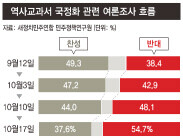hankyoreh
Links to other country sites 다른 나라 사이트 링크
Opposition to state-issued textbooks growing

Following the announcement by South Korea’s Education Ministry on Oct. 12 that it plans to bring Korean history textbooks under government control, a distinct change has been detected in trends in public opinion toward state-issued textbooks, which had been split between support and opposition. While the unity of public support for the plan has been weakening, public opposition appears to be rapidly consolidating in the Seoul area, among people in their 30s and 40s, and among those who are not affiliated with a political party.
In a public opinion poll about state-issued textbooks whose results were disclosed by the New Politics Alliance for Democracy (NPAD) on Oct. 20, 54.7% of respondents opposed the plan, 17.1 percentage points more than those who supported it (37.6%). The poll was conducted by Time Research, a polling organization, which was commissioned by the NPAD, from Oct. 16 to Oct. 17, with 1,131 voters around the country taking part.
The poll showed that public opposition to state-issued textbooks had gone up 6.6 percentage points from the previous week, while support for the plan fell by 6.4 percentage points. Opposition increased significantly among those who are unaffiliated with a party, supporters of the Saenuri Party (NFP), people in their 30s and 40s, and people from the Jeolla Province and the Seoul area, the poll indicated.
Opponents of state-issued textbooks also greatly outnumbered supporters in a survey conducted on mobile phones by polling organization STI (Oct. 17 and 18, 1,000 people around the country) by a margin of 57.5% to 33.7%, as reported by Media Today on Oct. 19.
“Even among supporters of the Saenuri Party, around 30% said that they preferred strengthening the government approval system over outright state-issued textbooks. The division inside the ruling party base over state-issued textbooks is becoming clearer,” STI said.
These polls show a marked contrast with surveys from last week by Gallup Korea and Real Meter, which found respondents split between support and opposition for the government’s plan.
“Even though this was a policy that President Park, the government, and the ruling party have been determined to push forward, public support for the plan never exceeded a certain level, even until recently. Based on the numbers alone, the two sides were split, but it appears there was a stronger underlying trend toward opposition in public opinion,” said Yoon Hee-woong, head of the center for public opinion analysis at Opinion Live.
The fact that public support for state-issued textbooks remains stuck around the mid 40% level despite the ruling party playing up ideological fears in a concentrated effort to sway public opinion in its favor suggests that there was never much momentum for the plan to begin with, Yun said.
Even if opposition to state-issued textbooks continues to increase for the time being, analysts think it is unlikely to surpass 60%, which would be an overwhelming margin.
“Since it was President Park and the ruling party that spearheaded the push for state-issued textbooks, the issue has been politicized from the very beginning. While distinct groups of those in favor and those opposed will appear as time goes by, the 30% who are considered dyed-in-the-wool Park Geun-hye supporters will continue to prop up approval for the initiative,” said a source with the NPAD.
“The fact that opposition to state-issued textbooks continues despite the onslaught from the ruling party is less due to the role of the opposition party than to the proactive stance of academics, civil society, and parents in their 30s and 40s. This is a factor explaining why opposition is spreading among the politically unaligned,” said Yun.
By Lee Se-young, staff reporter
Please direct questions or comments to [english@hani.co.kr]

Editorial・opinion
![[Column] Season 2 of special prosecutor probe may be coming to Korea soon [Column] Season 2 of special prosecutor probe may be coming to Korea soon](https://flexible.img.hani.co.kr/flexible/normal/500/300/imgdb/original/2024/0426/3317141030699447.jpg) [Column] Season 2 of special prosecutor probe may be coming to Korea soon
[Column] Season 2 of special prosecutor probe may be coming to Korea soon![[Column] Park Geun-hye déjà vu in Yoon Suk-yeol [Column] Park Geun-hye déjà vu in Yoon Suk-yeol](https://flexible.img.hani.co.kr/flexible/normal/500/300/imgdb/original/2024/0424/651713945113788.jpg) [Column] Park Geun-hye déjà vu in Yoon Suk-yeol
[Column] Park Geun-hye déjà vu in Yoon Suk-yeol- [Editorial] New weight of N. Korea’s nuclear threats makes dialogue all the more urgent
- [Guest essay] The real reason Korea’s new right wants to dub Rhee a founding father
- [Column] ‘Choson’: Is it time we start referring to N. Korea in its own terms?
- [Editorial] Japan’s rewriting of history with Korea has gone too far
- [Column] The president’s questionable capacity for dialogue
- [Column] Are chaebol firms just pizza pies for families to divvy up as they please?
- [Column] Has Korea, too, crossed the Rubicon on China?
- [Correspondent’s column] In Japan’s alliance with US, echoes of its past alliances with UK
Most viewed articles
- 1The dream K-drama boyfriend stealing hearts and screens in Japan
- 2‘We must say no’: Seoul defense chief on Korean, USFK involvement in hypothetical Taiwan crisis
- 3AI is catching up with humans at a ‘shocking’ rate
- 4S. Korea “monitoring developments” after report of secret Chinese police station in Seoul
- 5[Column] Can we finally put to bed the theory that Sewol ferry crashed into a submarine?
- 6[Editorial] Yoon cries wolf of political attacks amid criticism over Tokyo summit
- 7[Photo] “Comfort woman” survivor calls on president to fulfill promises
- 8Doubts remain over whether Yoon will get his money out of trip to Japan
- 9Up-and-coming Indonesian group StarBe spills what it learned during K-pop training in Seoul
- 10[Editorial] Was justice served in acquittal of Samsung’s Lee Jae-yong?